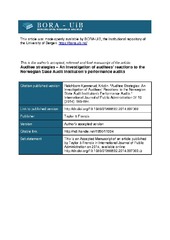Auditee Strategies - An Investigation of Auditees’ Reactions to the Norwegian State Audit Institution’s Performance Audits
Peer reviewed, Journal article
Accepted version
Permanent lenke
https://hdl.handle.net/1956/11994Utgivelsesdato
2014Metadata
Vis full innførselSamlinger
- Department of Government [457]
Originalversjon
https://doi.org/10.1080/01900692.2014.907309Sammendrag
This article contributes to theory on accountability – how it is played out and responded to. It uses the Norwegian State Audit Institution (SAI) as an illustration. The responses of the audited entities to the SAI’s institutional pressure were identified through an analysis of four different reports. The selection of cases was based on a classification of performance audit reports published and followed up by the SAI during 2000–2011, and on the ensuing debates in Parliament. Four auditee strategies were identified. They indicate that performance audit has impact when the auditees agree with the conclusions of the SAI. Sanctions from the control committee and the Parliament are equally important. Changes in the audited entities can be induced despite disagreements. These situations mirror political constellations in Parliament and reflect political values. Even though the extent of sanctions and conflict of opinion matter for the auditees’ responses, the effects are context dependent.
